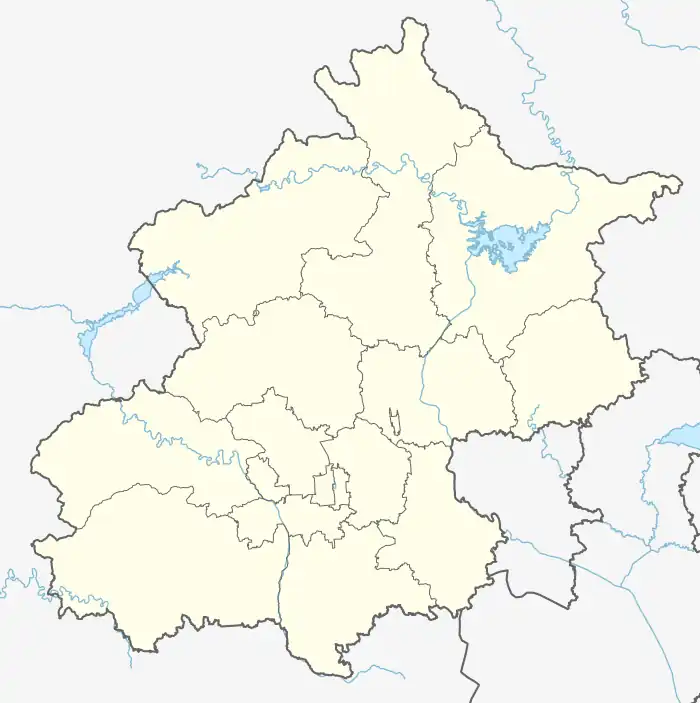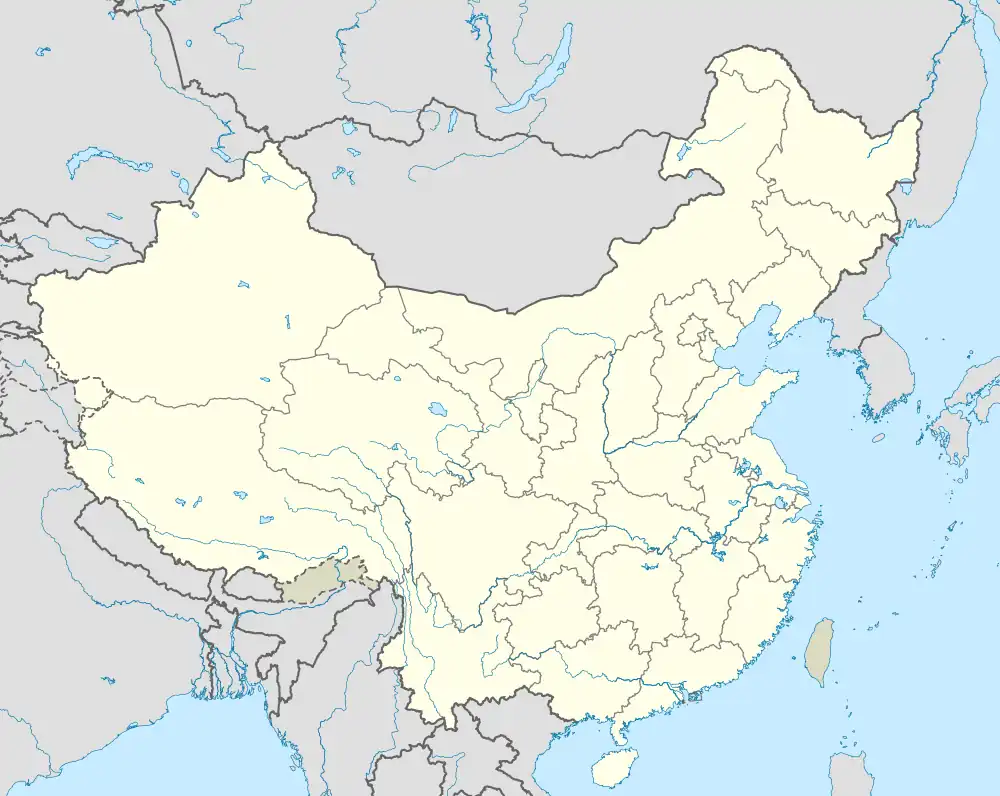Xibeiwang
Xibeiwang Area (Chinese: 西北旺地区; pinyin: Xīběiwàng Dìqū) is an area and a town on the northeast of Haidian District, Beijing, China. It borders Shigezhuang Subdistrict, Shahe and Shangzhuang Towns to its north, Huilongguan, Qinghe, Shangdi and Malianwa Subdistricts to its east, Qinglongqiao and Xiangshan Subdistricts to its south, Wenquan and Sujiatuo Towns to its west. The population of Xibeiwangg was 164,795 in 2020.[1]
Xibeiwang Area
西北旺地区 Xibeiwang Town (西北旺镇) | |
|---|---|
.jpg.webp) Zhongguancun No.1 Building Group within the Town, 2021 | |
 Xibeiwang Area  Xibeiwang Area | |
| Coordinates: 40°02′26″N 116°17′15″E | |
| Country | China |
| Municipality | Beijing |
| District | Haidian |
| Village-level Divisions | 17 communities 8 villages 7 residential area |
| Area | |
| • Total | 50.94 km2 (19.67 sq mi) |
| Population (2020) | |
| • Total | 164,795 |
| • Density | 3,200/km2 (8,400/sq mi) |
| Time zone | UTC+8 (China Standard) |
| Postal code | 100094 |
| Area code | 010 |
The name Xibeiwang is a corruption of Xibaiwang (Chinese: 西百望; lit. 'West Baiwang'), a name of this region given for its location west of Baiwang Mountain. The mountain, in turn, gets its name for the fact that its peak can supposedly still be visible from a hundred Chinese miles away.[2]
History
| Year | Status | |
|---|---|---|
| 1949 | Xibeiwang Township, part of the 16th District of Peiping | Dongbeiwang Township, part of the 16th District of Peiping |
| 1957 | Xibeiwang Township | Established as Nongda Farm |
| 1858 | Incorporated into Yongfeng People's Commune | |
| 1961 | Split into two, western part formed Yongfengtun People's Commune | Split into two, eastern part formed Dongbeiwang People's Commune |
| 1970 | Renamed to Yongfeng People's Commune | |
| 1978 | Merged to form Sino-Japanese Friendship People's Commune | |
| 1979 | Renamed to Yongfeng People's Commune | |
| 1984 | Split into two, western part formed Yongfeng Township | Split into two, eastern part formed Dongbeiwang Township |
| 2003 | Merged to form Xibeiwangg Town | |
| 2011 | Became an area while retaining the status of a town | |
Administrative Divisions
As of 2021, Xibeiwang Area included 32 subdivisions, with 17 being communities, 8 being villages and 7 being residential areas for stock economic cooperatives:[4]
| Administrative Division Code | Subdisvision Names | Name Transliteration | Type |
|---|---|---|---|
| 110108028003 | 六里屯 | Liulitun | Community |
| 110108028004 | 亮甲店 | Liangjiadian | Community |
| 110108028005 | 屯佃 | Tundian | Community |
| 110108028006 | 大牛坊 | Daniufang | Community |
| 110108028007 | 小辛店 | Xiaoxindian | Community |
| 110108028008 | 友谊嘉园 | Youyi Jiayuan | Community |
| 110108028009 | 西六里屯 | Xi Liulitun | Community |
| 110108028010 | 航天城 | Hangtiancheng | Community |
| 110108028011 | 西山林语 | Xishan Linyu | Community |
| 110108028012 | 冷泉 | Lengquan | Community |
| 110108028013 | 韩家川 | Hanjiachuan | Community |
| 110108028014 | 唐家岭 | Tangjialing | Community |
| 110108028015 | 土井 | Tujing | Community |
| 110108028016 | 航天城五院 | Hangtiancheng Wuyuan | Community |
| 110108028017 | 燕保辛店家园 | Yanbao Xindian Jiayuan | Community |
| 110108028018 | 青棠湾 | Qingtangwan | Community |
| 110108028019 | 天阅西山 | Tianyue Xishan | Community |
| 110108028203 | 西北旺 | Xibeiwang | Village |
| 110108028204 | 韩家川 | Hanjiachuan | Village |
| 110108028205 | 冷泉 | Lengquan | Village |
| 110108028208 | 亮甲店 | Liangjiadian | Village |
| 110108028210 | 屯佃 | Tundian | Village |
| 110108028211 | 永丰屯 | Yongfengtun | Village |
| 110108028213 | 皇后店 | Huanghoudian | Village |
| 110108028214 | 西玉河 | Xiyuhe | Village |
| 110108028500 | 唐家岭村 | Tangjialingcun | Residential Area |
| 110108028501 | 土井村 | Tujingcun | Residential Area |
| 110108028502 | 东北旺村 | Dongbeiwangcun | Residential Area |
| 110108028503 | 六里屯村 | Liulituncun | Residential Area |
| 110108028504 | 大牛坊村 | Daniufangcun | Residential Area |
| 110108028505 | 东玉河村 | Dongyuhecun | Residential Area |
| 110108028506 | 小牛坊村 | Xiaoniufangcun | Residential Area |
References
- "北京市海淀区第七次全国人口普查公报" (PDF). Beijing Haidian Bureau Of Statistics. Retrieved 2022-10-04.
- Beijing shi Haidian qu di ming zhi. Haidian qu di ming zhi bian ji wei yuan hui, 《海淀区地名志》编辑委员会. (Di 1 ban ed.). Beijing: Beijing chu ban she chu ban. 1992. ISBN 7-200-01890-2. OCLC 38214803.
{{cite book}}: CS1 maint: others (link) - Zhong hua ren min gong he guo zheng qu da dian. Bei jing shi juan. Li li guo, Li wan jun, Wu shi min, 李立国., 李万钧., 吴世民. Bei jing: Zhong guo she hui chu ban she. 2013. ISBN 978-7-5087-4058-4. OCLC 910451741.
{{cite book}}: CS1 maint: others (link) - "2021年统计用区划代码和城乡划分代码". www.stats.gov.cn. Retrieved 2022-10-07.